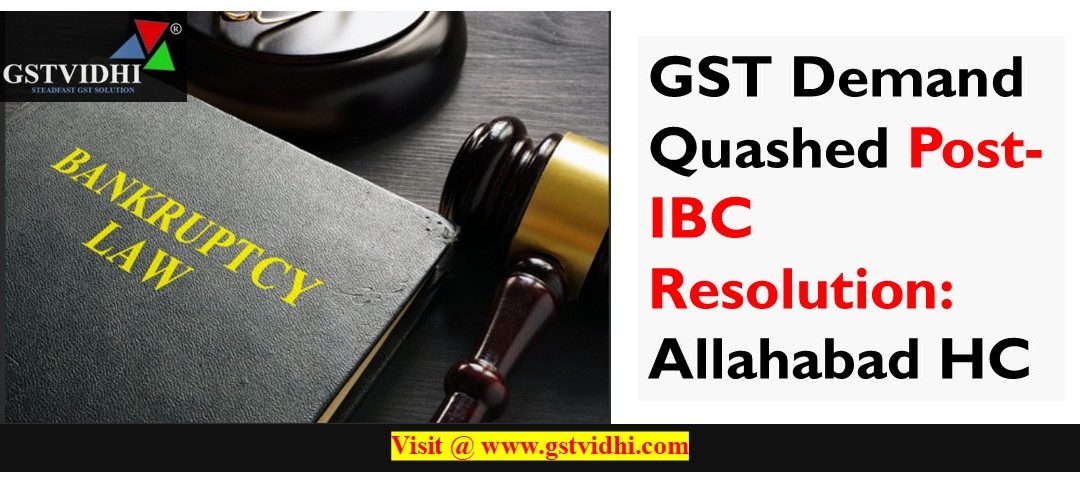
GST Demand Quashed Post-IBC Resolution: Allahabad HC Reiterates
“Clean Slate” Principle in Srei Equipment Case
Srei
Equipment Finance Ltd v. State of U.P. & Others (Writ Tax No. 155 of 2024 | Order Date: 9 July 2025 | High
Court of Judicature at Allahabad)
Summary:
The Allahabad High
Court in its landmark ruling on 9 July 2025, quashed two GST demands
totaling several crores against Srei Equipment Finance Ltd, holding that
once a Resolution Plan under the Insolvency and Bankruptcy Code (IBC)
has been approved by the National Company Law Tribunal (NCLT), no further
tax proceedings under GST laws for prior periods can be initiated or
sustained.
The Court relied on a
catena of precedents including the Supreme Court rulings in Ghanshyam Mishra
& Sons v. Edelweiss ARC and Vaibhav Goyal v. DCIT, and held that
the GST department’s assessment orders for FY 2017–18 and show cause notice for
FY 2018–19 were legally unsustainable as they violated the core principles of
IBC.
Facts of
the Case
1. CIRP
Initiated: The petitioner company underwent Corporate
Insolvency Resolution Process (CIRP) under the IBC on 8 October 2021,
and a Resolution Professional (RP) was appointed.
2. Notice
to GST Department: The RP duly notified the GST
Department at Meerut about the ongoing CIRP and invited claims, as required
under IBC.
3. Resolution
Plan Approved: The NCLT approved the Resolution Plan
on 11 August 2023, which was later affirmed by the NCLAT on 5 January
2024.
4. GST
Department Raises Fresh Demands
o Assessment
Order dated 26 December 2023 (for FY 2017–18);
o Show
Cause Notice dated 15 January 2024 (for FY 2018–19), both
issued after the approval of the Resolution Plan.
5. Writ
Filed: The petitioner challenged the above actions under Article
226, seeking quashing of both the assessment order and show cause notice.
Legal
Issues
1. Whether
fresh GST demands can be initiated after approval of a Resolution Plan
under IBC?
2. Does
Section 31(1) of the IBC extinguish all past liabilities, including statutory
dues not included in the Resolution Plan?
3. Are
the department’s actions violative of the “clean slate” principle?
Petitioner’s
Submissions
- Once the Resolution Plan is approved
under Section 31 of IBC, all prior claims, including statutory
dues, stand extinguished if not part of the plan.
- The GST Department was duly
notified and had an opportunity to submit its claim during the CIRP.
- The Supreme Court in Ghanshyam
Mishra, Vaibhav Goyal, and Essar Steel has clearly ruled
that no post-approval claims can be entertained.
Respondent’s
Defense
- The department contended that the
assessments relate to pre-CIRP tax periods, which were not
assessed earlier.
- According to them, such assessment
proceedings could be completed even after approval of Resolution Plan,
since tax was due from past periods.
- They also argued that non-inclusion
of GST dues in the plan cannot extinguish the right to assess and
recover lawful dues.
Court’s
Observations and Findings
1. Reference to NS Papers
and Supreme Court Precedents
The Court cited its own
earlier judgment in NS Papers Ltd v. Union of India (Writ Tax No. 408 of
2021), which clearly held:
"Once a resolution
plan is approved by NCLT, all other creditors are barred from raising fresh
demands thereafter."
The Court noted that this
view has been endorsed by the Supreme Court in:
- Ghanshyam Mishra & Sons (2021)
- Vaibhav Goyal v. DCIT (2025)
- Essar Steel India Ltd. through CoC v.
Satish Gupta (2019)
2. Section 31(1) IBC is
Overriding
“Section 31(1) of the
IBC, once a plan is approved, binds all stakeholders, including government
authorities.”
This means that even tax
authorities cannot raise demands for dues not incorporated in the
Resolution Plan.
3. Clean Slate Principle
The Court reaffirmed the
legal principle:
“The successful
resolution applicant cannot be suddenly faced with undecided or belated claims.
Such action would frustrate the core objective of IBC—to give the corporate
debtor a fresh start.”
Thus, the impugned GST
orders were held to be legally unenforceable.
Final
Judgment
1. Writ
Petition Allowed: The writ filed by Srei Equipment Finance
Ltd was allowed.
2. Assessment
Order Quashed: The order dated 26.12.2023 passed
under Section 73 of CGST/UPGST Act for FY 2017–18 was quashed.
3. SCN
Quashed: The show cause notice dated 15.01.2024 for FY
2018–19 under Section 73 was also quashed.
4. No
Further Proceedings Permissible: The Court held that the
department cannot initiate or continue any GST proceedings for periods
prior to the Effective Date of the Resolution Plan.
Related
Cases
- Ghanshyam Mishra & Sons v.
Edelweiss ARC, SC (2021): Once Plan approved, past
dues extinguished.
- Vaibhav Goyal v. DCIT,
SC (2025): Tax dues not included in Plan are unenforceable.
- Committee of Creditors v. Essar Steel,
SC (2019): No undecided claims post-resolution.
Final Word
“The IBC aims to
rehabilitate—not punish—the successful resolution applicant. Post-plan tax
demands defeat the clean slate principle.”
— Allahabad High Court, 9 July 2025
Disclaimer: All the Information is based on the notification, circular advisory and order issued by the Govt. authority and judgement delivered by the court or the authority information is strictly for educational purposes and on the basis of our best understanding of laws & not binding on anyone.
Click here